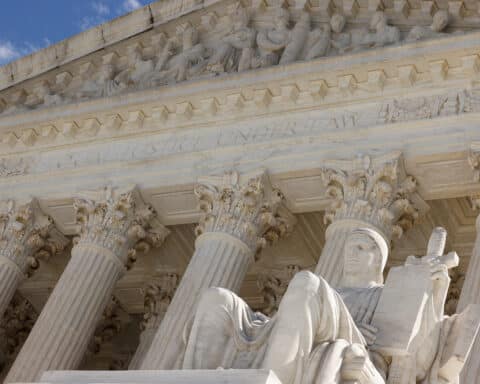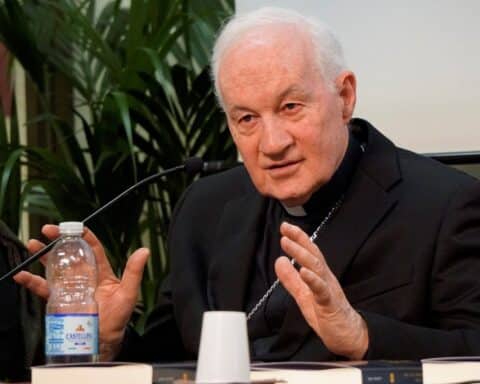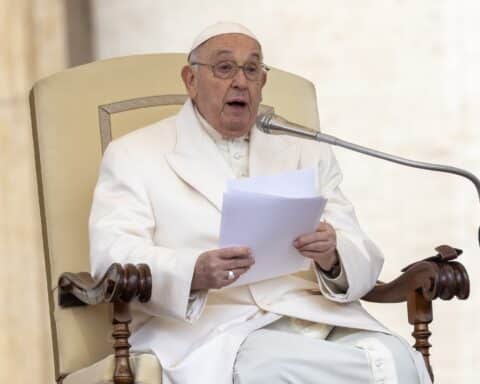As the number of people in the United States identifying as “transgender” continues to grow — a 2022 survey found that approximately 1.6% of American adults call themselves transgender or nonbinary, and 5% of young adults under 30 are now saying they have a different gender than their biological sex — the Church continues to seek ways to respond pastorally and doctrinally to this sea change in cultural mores.
To that end, at their spring plenary in Orlando, the U.S. bishops voted unanimously to update the Ethical and Religious Directives for Catholic Health Care Services, the sixth edition of which was approved in 2018. Specifically, the USCCB’s doctrine committee sought approval to move forward with incorporating its “Doctrinal Note on the Moral Limits to Technological Manipulation of the Human Body,” published in March 2023, into the third part of the ERDs, on the “professional-patient” relationship. This section has been unchanged since 1994.
“At that time it was not envisioned that it might be necessary to include specific guidance concerning radical modifications of the human body such as are widely advocated and practiced today for the treatment of those suffering from gender dysphoria,” said Bishop Daniel Flores of Brownsville, Texas, chair of the Committee on Doctrine.
The doctrinal note states unequivocally the Church’s teaching on gender and the human body: “The human person, body and soul, man or woman, has a fundamental order and finality whose integrity must be respected. Because of this order and finality, neither patients nor physicians nor researchers nor any other persons have unlimited rights over the body; they must respect the order and finality inscribed in the embodied person.”
In short, Catholic health care services should not be involved in any procedure that would assist in the physical “transition” of a person from his or her biological sex.
Advocates for “gender-affirming” surgery have voiced concerns that the dominance of Catholic health care facilities in more and more regions of the United States means that people seeking to “transition” will be denied the services they seek.
The decision of the U.S. bishops to update the ERDs has been called in some media outlets “a disaster” and “unequivocally harmful.” One commentator even suggested that future policy based on the March doctrinal note would result in a “genocide” of people who identify as transgender. This inflammatory rhetoric, however, does not reflect the thoughtful nature of the public debate the bishops shared during the assembly, nor does it advance the urgently needed conversation surrounding the bishops’ efforts to clarify the limits of medical intervention in the cases of transgender-identifying patients. Those who spoke in Orlando emphasized the necessary differences between pastoral and doctrinal approaches, and encouraged “wide and deep” consultation with the medical community, experts and people suffering from gender dysphoria in the process of updating the ERDs.
The right of Catholic hospitals to administer care according to the ethical norms of the Catholic Church cuts to the heart of religious freedom. A cornerstone of our constitutional order, religious freedom guarantees the right to act in accordance with the dictates of conscience and the moral principles of a particular religious tradition.
Catholic health care institutions, guided by the dictates of the Catholic faith, have a long history of providing compassionate care to individuals from all walks of life. These institutions have the right to establish and follow policies that align with their religious teachings, even if they may differ from prevailing cultural norms. Catholic hospitals and medical institutions follow the ERDs, which expound a “theological basis for the Catholic health care ministry.” These principles emphasize the sacredness of human life, the intrinsic dignity of each person and the importance of the natural order. While some may argue that denying certain types of elective medical procedures to transgender-identifying patients is discriminatory, Catholic hospitals must strive to maintain ethical integrity by adhering to these principles. Should the ERDs be revised in accordance with the bishops’ doctrinal note, this would not be an effort to deny care to those who identify as transgender but to establish limits on procedures that conflict with Catholic beliefs, such as “gender-affirming” surgeries or hormonal treatments.
In fact, far from being restrictive or prohibitory, on the whole the ERDs direct Catholic institutions to administer care to those most in need according to Catholic social teaching. In fact, the ERDs begin by saying, “The Church has always sought to embody our Savior’s concern for the sick.” Compassion, the needs of the poor and the sacredness of every life — these are the guiding lights of Catholic medical care.
Medical intervention for transgender-identifying patients, including the removal of healthy sexual organs or the administration of chemical puberty blockers, is not a simple clash between individual rights and institutional values. Transgender-identifying patients must be met by Catholic institutions with care and concern.
But Catholic hospitals must uphold their core principles and provide care within the bounds of Catholic teaching in order to remain Catholic. The perceived rights of a person who identifies as transgender are not infringed when certain medical procedures are refused in Catholic facilities because they are not sanctioned by Catholic moral teaching. Absolute individual autonomy is not a principle of Catholic health care.
The U.S. bishops’ approach to medical care for transgender-identifying patients in Catholic hospitals must be understood in the context of religious freedom and the ethical integrity of these institutions. Respecting the autonomy of religious organizations is an essential element of a diverse and pluralistic society.





